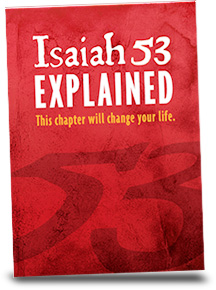Frequently Asked Questions
The book is about two basic questions. Is there a credible case that Jesus fulfils the role of the person described in Isaiah 53? If so, what are the implications of this for Jewish people and others?
Why should I take the Bible seriously today?
The Bible’s message of the Creator’s continuing relationship with humanity is no less relevant today than it was thousands of years ago. Although technological progress and developments in intellectual history have given us a very different outlook from that of our ancestors, human nature has remained essentially the same. We wrestle with the same mysteries of our ancestors – those of life and death and the quest for meaning amid the uncertainties of daily living. The Bible addresses all of these concerns – and others as well. If you open its pages, you might be surprised how contemporary an ancient text can be.
Isn’t it impossible for Jesus to be the subject of Isaiah 53, since the Messiah has evidently not come?
This question reveals a set of assumptions that we are asking questions about. Is it truly evident that the Messiah has not come? If this is so, then yes, it is impossible for Jesus to be the subject of Isaiah 53 (assuming that the subject of Isaiah 53 is the Messiah). But how is it evident that Messiah has not yet come? If it is because of the traditional belief that the coming of the Messiah will bring the “world to come,” then again, yes, it is impossible for Jesus to be the Messiah. But what if the role of the Messiah includes that of Suffering Servant? What if His suffering on our behalf, as it is described in Isaiah 53, is precisely what Jesus was sent to fulfill? These are the issues we seek to probe, from within Jewish tradition and through the record of the New Testament.
The idea of the Messiah suffering is not a Jewish concept – is it?
Although not a common motif in Jewish sacred literature, this concept is not unknown – as you will discover if you take the time to read the chapter devoted to an in-depth examination of this question.
How do we know Isaiah 53 was written before the time of Jesus?
One of the most important archeological discoveries of all time is the Dead Sea Scrolls, which includes an almost intact scroll of the book of Isaiah. Scientific consensus, arrived at by analysis of the scroll itself, plus paleographic and scribal dating studies, place the scroll at 150-100 B.C. This is incontrovertible evidence that Isaiah 53 was written before the time of Jesus.
Is the Isaiah 53 you read in the Jewish Bible or Christian?
Actually, it’s in both. The Jewish Bible is composed of the Torah (Law), Nevi’im (Prophets) and the Ketuv’im (Writings). Isaiah is one of the prophets of the Jewish Bible. The Christian Bible is composed of the Jewish Bible, plus the writings of the New Testament. From its earliest beginnings, Christians have acknowledged that the claims concerning Jesus depend upon his fulfilment of the earlier prophecies of the Jewish Bible. If Jesus is not the fulfilment of Isaiah 53 and a host of other prophecies of the Jewish Bible, he is not the Messiah. But what if he is? That is the heart of the matter.


